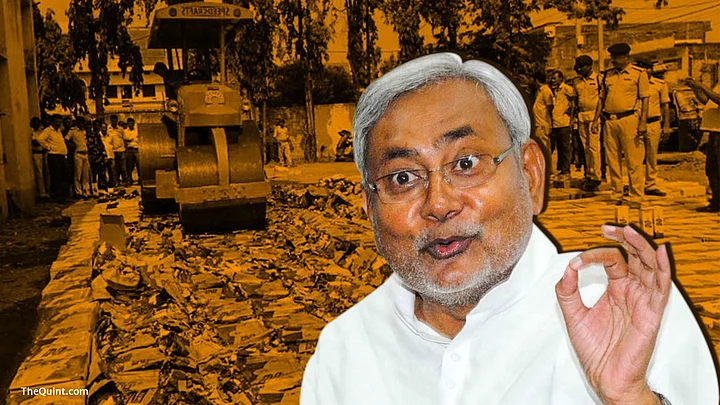Over the last few years, political parties have been crying themselves hoarse with promises of ‘development’.
Bihar Chief Minister Nitish Kumar has gained a reputation for being a leader who propagates sustainable development, and his liquor ban is proof of this. The people of Gujarat have seen countless alcohol bottles being destroyed under road-rollers. Today, Bihar is witnessing similar scenes.
Nitish, who hopes to improve his image by ridding the state of its vices, has moved beyond roads and electricity, choosing instead to put Bihar on the path of social change.
Let’s take a closer look at Bihar’s alcohol ban.
Rise in Morale, Fall in Revenue
How much of a financial impact will a statewide liquor ban have? Before he announced the liquor ban on 1 April 2016, Nitish Kumar must have spent a few nights puzzling over this question.
According to a report submitted by Bihar’s Finance Minister Abdul Bari Siddiqui in the assembly in December 2016, the revenue generated through taxes in the first half of the financial year 2016-17 was reduced by 16.23 percent as compared to the previous year. The amount of tax generated last year was Rs 11,419 crore, which reduced to Rs 9,565 crore in the same period of 2016-17.

The fact of the matter remains that the state received Rs 5,000 crore from VAT and excise duty on liquor. However, the chief minister claims that the revenue for the year 2016-17 is almost the same as the previous financial year.
The chief minister has repeatedly reiterated the fact that though the prohibition of liquor brought about a loss in revenue by Rs 5,000 crore, people are now saving Rs 10,000 crore and using that money to increase their standard of living.
Claim of Increase in Consumption of Milk Byproducts
The government claims that after the sale of alcohol has stopped, the consumption of milk and its byproducts has increased manifold. These include lassi, rasgullas, gulab jamun, peda, etc.
And the list of other commodities whose sale has purportedly increased is longer – honey, biscuits, nuts, furniture, hosiery, readymade garments, sewing machines, handicraft, expensive sarees, tractors, bikes, auto, cars, etc.

What Do Prohibition Statistics Claim?
According to official statistics in the state, since April last year after the prohibition was implemented:
- 11,00,9000 litres of country and foreign has been liquor seized.
- So far, liquor bottles have been destroyed in 28 districts, while the process continues in the remaining districts.
- Action has been taken against 150 police officers and 112 policemen in case of negligence in alcoholism.
- 12 policemen have been dismissed from service.
- Over 45,000 people have been arrested for violating the law related to the prohibition.
Interestingly, it has been reported that over 9,00,000 litres of liquor was kept in police godowns and has been consumed by rats in the state. Commenting on that, Kumar said:
Efforts were made to try and tarnish Bihar’s name. We gave instructions to publicly destroy the seized liquor. 9,00,00 litres of liquor has been seized. We are not going to spare anyone.

Status of Crime After Prohibition
Facts show that after prohibition of liquor, there has been a reduction in crimes like murder and robbery in the state. However, cases of abduction have increased.

A Phase of Social Change in Politics
Kumar himself believes that there is nothing bigger than mental, ideological, and a social change. He says that Bihar has already been the centre of political change, but there is a lack of social movements here.
He had made it clear that a strong campaign against dowry and child marriage will be initiated in the state. Cleaning the Ganges is also on the top of his agenda.
What’s Right is Right...
Remember, Kumar had strongly supported Modi government's demonetisation, unlike some other political parties. He also pressurised the Centre to take down benami properties. When many opposition leaders were demanding evidence of surgical strikes against Pakistan, Kumar was patting the army’s back.
In such a situation, it can be assumed that Bihar is now ready to change itself by putting an end to the blame game. However, due to geographical and economic conditions, it could not be like Gujarat even if the intention to follow in its footsteps is now clearly visible.
(This was originally published in Quint Hindi.)
(At The Quint, we question everything. Play an active role in shaping our journalism by becoming a member today.)
